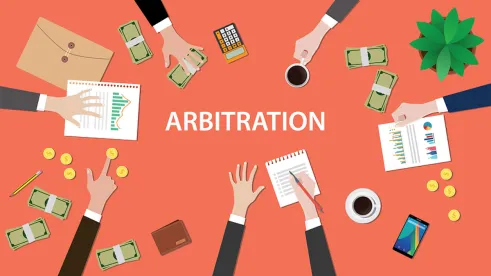The Singapore Court of Appeal (Appellate Court), in National Oilwell Varco Norway AS v. Keppel FELS (Keppel),1 allowed a non-party, National Oilwell, to enforce an award in favor of a company named in the award, Hydralift, that had since dissolved. The Court found that such an enforcement is possible even after adopting a mechanical process prescribed under Section 19 of the International Arbitration Act (IAA) since National Oilwell had taken over all the assets, rights, liabilities and obligations of Hydralift subsequent to a merger in which Hydralift had dissolved as an entity. Allowing the enforcement of the award, the Appellate Court found that the legal personality of Hydralift continued in National Oilwell thereby making this a simple case of a misnomer.
FACTUAL BACKGROUND
In 1996, Keppel FELS (KFELS) entered into a contract with Hydralift, a Norwegian company, for the design and supply of a turret bearing system (Contract). The parties agreed that the Contract will be governed by Singaporean law and that any dispute between them shall be resolved by arbitration seated in Singapore. After a dispute arose between the parties in 1999, and the parties failed to mutually resolve it, KFELS commenced arbitration proceedings against Hydralift seeking damages for breach of contract in 2007.
However, before 2007, Hydralift had dissolved as a separate legal entity. In 2002, Hydralift became a wholly owned subsidiary of National Oilwell-Hydralift (NOH). Moreover, in October 2004, Hydralift merged with NOH and was struck off the Norwegian register of companies. In December 2004, NOH merged with National Oilwell Norway AS (which changed its name to NOV Norway in 2010).
In the arbitration proceedings commenced by KFELS, an arbitral tribunal was constituted in 2008. NOV Norway participated in these arbitral proceedings, by defending against KFELS’ claim and filing a counterclaim, as Hydralift. In 2015, in all court proceedings that were initiated by KFELS in relation to the arbitration proceedings, Hydralift was named as the defendant and NOV Norway participated in all these proceedings as Hydralift. In September 2019, after 12 years, the arbitral tribunal passed an award in favor of Hydralift and ordered KFELS to pay SGD 0.7 million as damages and SGD 3.1 million as costs (Award).
Accordingly, NOV Norway filed an ex parte application before the General Division of the Singapore High Court (High Court) to enforce the Award. KFELS also filed an application in the High Court to resist the enforcement of the Award. The High Court allowed the application by KFELS and refused enforcement of the Award. Aggrieved by the decision of the High Court, NOV Norway filed an appeal in the Appellate Court.
J U D G M E N T
Effect of the 2004 Mergers under Norwegian Law
NOV Norway argued that during the merger, all the assets, rights, obligations and liabilities of Hydralift were transferred to it which effectively made NOV Norway the correct party to the arbitration. On the other hand, KFELS contended that NOV Norway is a distinct entity to Hydralift, and a decision to allow a non-party to enforce the award would be against the manifest intent of the arbitral tribunal.
The Appellate Court dismissed KFELS’ contention that NOV Norway was a distinct entity to Hydralift after the 2004 mergers. It relied upon the law of Norway, as the law of the country of incorporation of both the companies, to determine the effect of the mergers upon the legal personality of Hydralift. Applying the principle of continuity under Norwegian law, the Appellate Court found that the legal personality of Hydralift continued in NOV Norway since all assets, rights, obligations and liabilities of Hydralift had automatically transferred to NOV Norway after the merger.2
Effect of the Non-Assignment Clause under the Contract
In the proceedings before the High Court, the High Court agreed with NOV Norway that the non-assignment clause under the Contract, which restrained Hydralift from assigning any rights or benefit under the Contract,3 does not prohibit transmission of rights of Hydralift to NOV Norway under the arbitration agreement. On appeal, KFELS again contended, by relying on a different expert witness, that NOV Norway cannot arbitrate on behalf of Hydralift due to the non-assignment clause contained in the Contract.
The Appellate Court dismissed KFELS’ contention by finding that under Norwegian law, a non-assignment clause needs to have a “specific basic” (i.e. it needs to specifically restrict rights) to restrain any transfer of rights during a merger. Therefore, it held that the broad non-assignment clause under the Contract does not prohibit the transmission of Hydralift’s right to NOV Norway under the arbitration agreement.4
Power of Singapore courts to enforce awards when a party has been incorrectly named
KFELS argued that the Appellate Court should not enforce this Award since the Singaporean courts do not have the power to go beyond the names written by the arbitral tribunal in the award when enforcing an award under Section19 of the IAA.5 As per KFELS, undertaking any factual analysis would be in violation of the mechanical approach to enforcement prescribed under Section 19 of IAA. On the other hand, NOV Norway argued that courts have the power under Section 19 to give “effect” to the true state of affairs in a situation where one of the parties has been incorrectly named.
The Appellate Court agreed with NOV Norway and found that the power to enforce an award in a misnomer situation is not inconsistent with the mechanical approach to enforcement. It held that in a true misnomer situation where the court does not have to be embroiled in the Tribunal’s reasoning or the merits of the dispute to identify the parties to an award, enforcing an award would not violate the mechanical approach required under Section 19 of the IAA.
Further, the Appellate Court found that there was a true misnomer situation in this case since Hydralift and NOV
Norway are the same legal person even if the fact of the 2004 mergers was not disclosed to KFELS or the Tribunal.6 The Appellate Court held that determination of the correct party to an award should be made basis the substance of the correct facts before the court and not the facts that were known by the parties, at the time of commencement of the arbitration or during the arbitration proceedings, which influenced the parties’ intentions at these times.7 It also found that it was not necessary that this misnomer should have been corrected during the arbitration proceedings.8 Therefore, the Appellate Court found that it has the power to enforce the Award under Section 19. In reaching this finding, the Appellate Court emphasized that such an approach would be consistent with its aim to facilitate the enforcement of arbitral awards.9
Applicability of doctrine of estoppel to prevent NOV Norway from denying that Hydralift was the actual party
The High Court had refused the enforcement of the Award by finding that NOV Norway was estopped from denying that Hydralift was a separate and actual party since it represented that Hydralift (and not it) was the respondent in the arbitral proceedings for over 12 years. In the appeal, NOV Norway contended that while it did represent that Hydralift was the correct party in the arbitral proceedings, it was not prevented by the doctrine of estoppel to enforce the Award since there was no detrimental reliance by KFELS upon NOV Norway’s representations.
The Appellate Court agreed with NOV Norway to find that there was no detrimental reliance on the part of KFELS upon NOV Norway’s representations.10 It found that there was no basis or evidence to conclude that KFELS would not have carried on with the arbitration proceedings if it knew that NOV Norway, and not Hydralift, was the correct party to the arbitration. Accordingly, the Appellate Court refused to find that NOV Norway was prevented by the doctrine of estoppel from denying that Hydralift was the correct party to the Award.11
ANALYSIS AND OUTLOOK
This judgment reflects the pro-arbitration stance of the Singaporean courts as it emphasized the objective of upholding and enforcing arbitral awards while reaching its finding that NOV Norway, a non-party to the Award, may still enforce the Award. It also serves as a reminder to parties to correctly name the parties in arbitration proceedings. Despite allowing the appeal in favour of NOV Norway and enforcing the Award, the Appellate Court refused to award costs to NOV Norway due to NOV Norway’s failure to correct its name in the arbitration proceedings for over 12 years. Therefore, the parties’ failure to correctly state, or subsequently correct, the name of the parties is likely to result in increased costs of litigation for both parties.
Keppel can be contrasted with the judgment of the Indian Supreme Court in Gemini Bay Transcription Private
Limited v. Integrated Sales Service Limited (Gemini Bay).12 In Gemini Bay, the Indian Supreme Court enforced a foreign award against a non-signatory to the arbitration agreement under Section 47 of the Indian Arbitration and Conciliation Act, 1996. The court found that the ability of a non-signatory to be bound by an award cannot be raised at the enforcement stage and can only be raised before the arbitral tribunal or in a challenge filed at the seat of the arbitration. However, unlike Keppel, the Indian Supreme Court was faced with a situation where the award explicitly provided relief against the non-signatory, therefore the intention of the arbitral tribunal to bind the non-signatory was manifestly present. As mentioned above, this is different from Keppel wherein the Appellate Court enforced the Award upon NOV Norway’s application, despite NOV Norway not being explicitly named in the award, because failure to mention NOV Norway’s name could not be imputed as the intention of the tribunal when the tribunal did not know of the merger of Hydralift into NOV Norway. It will be interesting to note the approach that the Indian courts will adopt when a non-party to an award seeks to enforce an award against a party in India.
ENDNOTES
1 [2022] SGCA 24. 2 Id. at 53.
2 Id. at 53.
3 Clause 21 of the Contract provided that “[Hydralift] may not assign the contract or any part thereof or any benefit interest [sic] therein or thereunder and, for the avoidance of doubt and without limiting the generality of foregoing [sic], [Hydralift] may not assign any receivables or any sums due from the company under the terms of the contract.”
4 [2022] SGCA 24, at 61-71.
5 Section 19 of the IAA provides that “An award on an arbitration agreement may, by permission of the General Division of the High Court, be enforced in the same manner as a judgment or an order to the same effect and, where permission is so given, judgment may be entered in terms of the award.” (emphasis supplied).
6 [2022] SGCA 24, at 105. 7 Id. at 103.
7 Id. at 103.
8 Id. at 115.
9 Id. at 96 and 116.
10 Id. at 125. 11 Id. at 131.
12 (2022) 1 SCC 753. Also see https://www.natlawreview.com/article/indian-supreme-court-rules-enforcement-foreign-award-against-non-signatories-gemini



 />i
/>i

